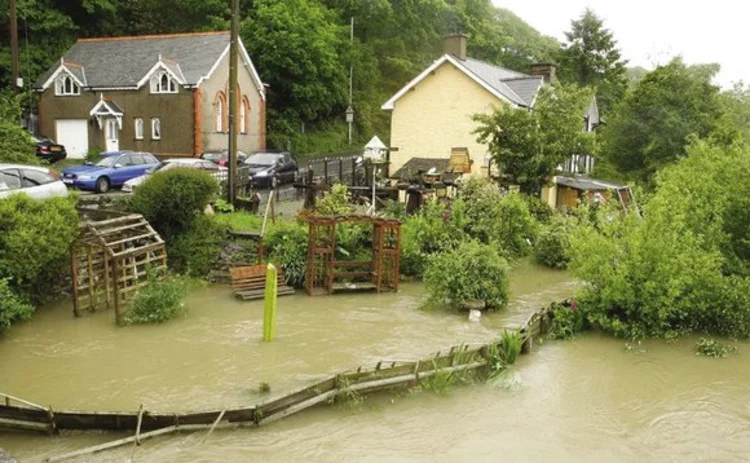
Is Europe Flood Re's Achilles' Heel?

It was congratulations all round at last night's joint meeting of All Party Parliamentary Groups - Insurance & Financial Services and Flood Defences - as Floods Minister Richard Benyon and the ABI's Aidan Kerr faced questions from MPs and various interest groups about the plans for Flood Re, the recently announced solution to the challenge of providing affordable insurance for households in high risk flood zones.
Benyon and Kerr have become quite a polished double act in the committee rooms of the House of Commons in the last couple of weeks. They lapped up the praise heaped on the government and insurance industry for coming up with an imaginative proposal for avoiding the chaos of a free market in flood insurance which could leave as many as 200,000 households without insurance. The praise is deserved because they have pulled the market back from a crisis but it wasn't unqualified.
The big cloud on the horizon as far as MPs are concerned is Europe.
Several MPs challenged the need to refer Flood Re to the European competition authorities under the rules governing state aid. They were concerned at the length of time the European Commission takes to deal with such references - it is amazing how slowly such a bloated bureaucracy moves - as much as with the risk that the scheme might be rejected. Mr Benyon and his departmental advisers were adamant that EU clearance was needed and that by applying for it up front they were being responsible and heading off potential trouble down the line.
Both the ABI and DEFRA were also relaxed about the potential delays in Brussels, pointing out that it will take two years to pass the legislation, get Flood Re set up and approved by the regulators (by no means an empty formality) and allow insurers to set up the necessary systems to manage high risk policyholders. By the time these processes are completed, they argued, Europe will have spoken.
They were rather more dismissive of another threat from Europe which I raised - the possible of a challenge in the European courts. I hope they are right but I still think Flood Re is vulnerable on this front. Here's why.
The rating model for Flood Re is partially a proxy using Council Tax bands. Properties in high risk areas will not be rated using an accurate risk-based model but by crude reference to 1991 property values (the date of the last revaluation for Council Tax purposes). I have some sympathy with the protests of the ABI and DEFRA that no better rating data is available, especially when it comes to surface flooding but I wonder if the European courts would be so benign?
They showed in the gender discrimination case that they take a very dim view of rating by proxy. In that case they ruled against insurers for using gender as a proxy for more complex rating factors and, as a result, insurers are no longer allowed to take gender into account when setting premiums.
The scenario of a challenge in the European courts is by no means impossible to imagine.
As Harriet Baldwin, MP for Worcester, pointed out there are quite a few people excluded from the Flood Re scheme because their properties are in Council Tax band H, the highest. The view of the ABI and DEFRA is that these households - estimated to be in "the low thousands" can afford to take their chances with what the free market throws up.
This could create some blatant unfairness with properties in the same locality, one in band G and one in band H, getting substantially different insurance deals. The sort of people in band H properties are going to be wealthy and articulate and may feel inclined to challenge this situation. Perhaps the best answer is for Flood Re to cover them.
The other major concern among MPs was the two year transitional period and the prospect of some insurers walking away from the general commitment to maintain the current status quo under the Statement of Principles. There is already some anecdotal evidence that this could be a problem. It will take some stern words from the ABI to its members to make sure that these remain isolated incidences. If they can't hold the line on this then then warm glow of approval the industry is currently basking in will quickly vanish.
Only users who have a paid subscription or are part of a corporate subscription are able to print or copy content.
To access these options, along with all other subscription benefits, please contact info@postonline.co.uk or view our subscription options here: http://subscriptions.postonline.co.uk/subscribe
You are currently unable to print this content. Please contact info@postonline.co.uk to find out more.
You are currently unable to copy this content. Please contact info@postonline.co.uk to find out more.
Copyright Infopro Digital Limited. All rights reserved.
You may share this content using our article tools. Printing this content is for the sole use of the Authorised User (named subscriber), as outlined in our terms and conditions - https://www.infopro-insight.com/terms-conditions/insight-subscriptions/
If you would like to purchase additional rights please email info@postonline.co.uk
Copyright Infopro Digital Limited. All rights reserved.
You may share this content using our article tools. Copying this content is for the sole use of the Authorised User (named subscriber), as outlined in our terms and conditions - https://www.infopro-insight.com/terms-conditions/insight-subscriptions/
If you would like to purchase additional rights please email info@postonline.co.uk
Most read
- Covéa shrinks staff numbers by almost a third amid further losses
- Aviva CEO warns home insurance premiums need to go up
- DLG or Esure – which Peter Wood baby is most likely to bounce back?
